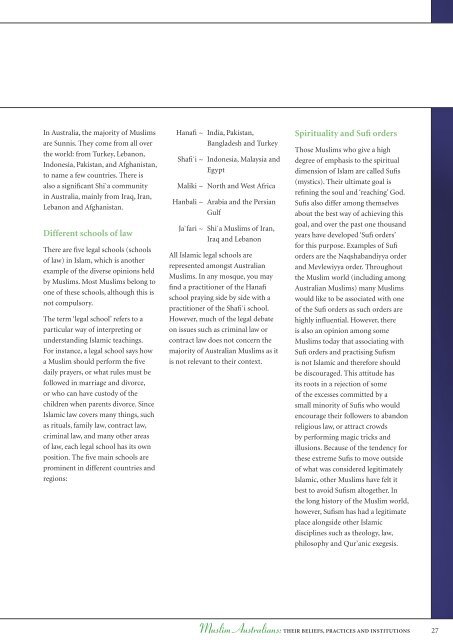Muslim Australians - Religion Cultural Diversity Resource Manual
http://www.islamicglobe.com
http://www.islamicglobe.com
You also want an ePaper? Increase the reach of your titles
YUMPU automatically turns print PDFs into web optimized ePapers that Google loves.
In Australia, the majority of <strong>Muslim</strong>s<br />
are Sunnis. They come from all over<br />
the world: from Turkey, Lebanon,<br />
Indonesia, Pakistan, and Afghanistan,<br />
to name a few countries. There is<br />
also a significant Shi`a community<br />
in Australia, mainly from Iraq, Iran,<br />
Lebanon and Afghanistan.<br />
Different schools of law<br />
There are five legal schools (schools<br />
of law) in Islam, which is another<br />
example of the diverse opinions held<br />
by <strong>Muslim</strong>s. Most <strong>Muslim</strong>s belong to<br />
one of these schools, although this is<br />
not compulsory.<br />
The term ‘legal school’ refers to a<br />
particular way of interpreting or<br />
understanding Islamic teachings.<br />
For instance, a legal school says how<br />
a <strong>Muslim</strong> should perform the five<br />
daily prayers, or what rules must be<br />
followed in marriage and divorce,<br />
or who can have custody of the<br />
children when parents divorce. Since<br />
Islamic law covers many things, such<br />
as rituals, family law, contract law,<br />
criminal law, and many other areas<br />
of law, each legal school has its own<br />
position. The five main schools are<br />
prominent in different countries and<br />
regions:<br />
Hanafi ~ India, Pakistan,<br />
Bangladesh and Turkey<br />
Shafi`i ~ Indonesia, Malaysia and<br />
Egypt<br />
Maliki ~ North and West Africa<br />
Hanbali ~ Arabia and the Persian<br />
Gulf<br />
Ja`fari ~ Shi`a <strong>Muslim</strong>s of Iran,<br />
Iraq and Lebanon<br />
All Islamic legal schools are<br />
represented amongst Australian<br />
<strong>Muslim</strong>s. In any mosque, you may<br />
find a practitioner of the Hanafi<br />
school praying side by side with a<br />
practitioner of the Shafi`i school.<br />
However, much of the legal debate<br />
on issues such as criminal law or<br />
contract law does not concern the<br />
majority of Australian <strong>Muslim</strong>s as it<br />
is not relevant to their context.<br />
Spirituality and Sufi orders<br />
Those <strong>Muslim</strong>s who give a high<br />
degree of emphasis to the spiritual<br />
dimension of Islam are called Sufis<br />
(mystics). Their ultimate goal is<br />
refining the soul and ‘reaching’ God.<br />
Sufis also differ among themselves<br />
about the best way of achieving this<br />
goal, and over the past one thousand<br />
years have developed ‘Sufi orders’<br />
for this purpose. Examples of Sufi<br />
orders are the Naqshabandiyya order<br />
and Mevlewiyya order. Throughout<br />
the <strong>Muslim</strong> world (including among<br />
Australian <strong>Muslim</strong>s) many <strong>Muslim</strong>s<br />
would like to be associated with one<br />
of the Sufi orders as such orders are<br />
highly influential. However, there<br />
is also an opinion among some<br />
<strong>Muslim</strong>s today that associating with<br />
Sufi orders and practising Sufism<br />
is not Islamic and therefore should<br />
be discouraged. This attitude has<br />
its roots in a rejection of some<br />
of the excesses committed by a<br />
small minority of Sufis who would<br />
encourage their followers to abandon<br />
religious law, or attract crowds<br />
by performing magic tricks and<br />
illusions. Because of the tendency for<br />
these extreme Sufis to move outside<br />
of what was considered legitimately<br />
Islamic, other <strong>Muslim</strong>s have felt it<br />
best to avoid Sufism altogether. In<br />
the long history of the <strong>Muslim</strong> world,<br />
however, Sufism has had a legitimate<br />
place alongside other Islamic<br />
disciplines such as theology, law,<br />
philosophy and Qur’anic exegesis.<br />
<strong>Muslim</strong> <strong>Australians</strong>:THEIR BELIEFS, PRACTICES AND INSTITUTIONS 27














